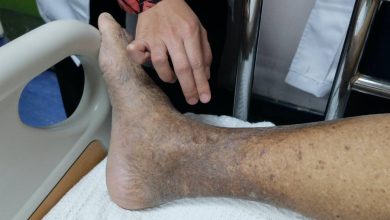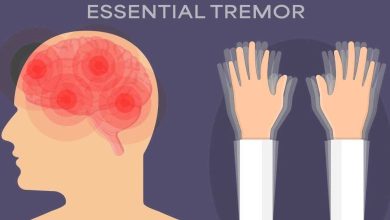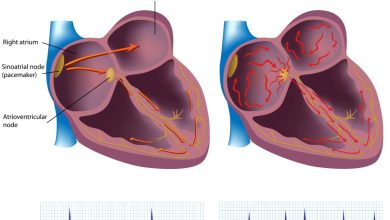Achalasia Treatment, Causes, Symptoms, Achalasia Diagnosis

What is Achalasia?
Achalasia (ay·kuh·lay·zhuh) or cardiospasm is a rare esophageal disorder that develops when your esophagus doesn’t move food and liquid to your stomach like it should.
Your esophagus is a muscular tube that runs from your mouth to your stomach. Normally, muscular contractions (peristalsis) in your esophagus push food and liquid down to your lower esophageal sphincter (LES). Your LES is a ring-shaped muscle that relaxes (opens) to let food move into your stomach and tightens (contracts) to keep contents in your stomach from backing up into your esophagus.
In achalasia, peristalsis doesn’t take place or doesn’t work as well as it should. And when it does, your LES doesn’t relax, so what you eat and drink stays in your esophagus instead of moving into your stomach. You have trouble swallowing your food or have other symptoms. You may lose a lot of weight and may develop malnutrition.
Cardiospasm affects 1 in 100,000 people in the U.S. It typically affects adults ages 25 to 60, but kids may develop it. Treatment includes surgery and medication, but achalasia symptoms often come back.
What are the Symptoms of Achalasia?
Cardiospasm symptoms develop slowly. You can have this disorder for months or years before noticing changes in your body. Symptoms include:
- Difficulty swallowing
- Bringing swallowed food back into your mouth
- Chest pain that comes and goes and may be severe
- Difficulty belching
- Heartburn
- Hiccups
- Unexplained weight loss
What Causes Achalasia?
Experts don’t know the exact reason why your esophagus doesn’t work like it should. One theory is that achalasia is an autoimmune disease (your body attacks itself) that a virus triggers. In this theory:
- Your immune system attacks nerve cells in your esophagus that control muscle function.
- Under attack, these cells slowly deteriorate.
- They stop driving the process that moves food and liquid through your esophagus to your stomach.
What are the Complications of Achalasia?
If you have achalasia, food may back up into your esophagus and into your windpipe, so you inhale food into your lungs. If that happens, you may develop complications like:
- Aspiration pneumonia
- Bronchiectasis
- Lung infections
- Increased risk of esophageal cancer
- Malnutrition
How do healthcare providers Diagnose Cardiospasm?
A healthcare provider will do a physical exam. They’ll ask you to describe your symptoms and how long you’ve had them. Providers commonly use these three tests to diagnose cardiospasm:
- Esophagram test (barium swallow)
- Esophageal manometry test
- Upper endoscopy
How is Achalasia Treated?
Treatment focuses on relaxing your LES, the ring of muscle at the base of your esophagus. Treatment can’t cure achalasia, but nonsurgical and surgical options can help ease symptoms. Your healthcare provider will plan treatment depending on factors like your symptoms and your personal preferences. They’ll discuss these options with you so you both can decide what treatment makes sense for you.
Nonsurgical treatment for achalasia
Nonsurgical treatments for achalasia include balloon dilation and medication. Here’s more information:
- Balloon dilation. This procedure involves inserting a specifically designed balloon through your LES. You’ll be under light sedation during the procedure. Your provider inflates the balloon, which helps the muscle relax so food can move to your stomach. You may need several treatments to relieve your symptoms.
- Medication. This is another way to loosen your LES. Your provider may recommend injecting Botox® (botulinum toxin) into your LES. Other options include nifedipine (Procardia XL®, Adalat CC®) or isosorbide (Imdur®, Monoket®). These are pills that you’d take as prescribed.
Surgical treatment for achalasia
Your provider may recommend one of two noninvasive surgeries to loosen your lower esophageal sphincter (LES). Those surgeries are:
- Laparoscopic Heller myotomy. In this surgery, your provider inserts an endoscope into your esophagus. The endoscope has tiny tools that your provider uses to cut the muscle fibers.
- Peroral endoscopic myotomy (POEM). This procedure involves cutting the muscles on the side of your esophagus, the muscular ring and in the upper part of your stomach.
Very rarely, your symptoms may be so severe that your provider will recommend an esophagectomy to remove your esophagus.
Treatment complications
Research shows laparoscopic Heller myotomy and POEM surgery are effective, but may cause the following complications:
- Achalasia symptoms that come back
- GERD
- Very rarely, surgery may rupture your esophagus
What can I expect if I have achalasia?
Achalasia symptoms often come back after treatment. You’ll need long-term follow-up so your healthcare provider can:
- Do tests to confirm that your esophagus lets enough food and fluid into your stomach
- Check for signs of GERD
- Check for signs of esophageal cancer
Can achalasia affect my life expectancy?
Without treatment, achalasia may lead to malnutrition, which can be life-threatening and affect your life expectancy. With treatment, you may expect to live as long as other people who don’t have the disorder.
How do I take care of myself?
Achalasia may come back after treatment. The disorder’s symptoms develop over time. Here are some suggestions for ways to keep food moving and limit the impact the disorder can have on your life:
- Cut your food into small, bite-size pieces and chew it thoroughly.
- Drink lots of water while you eat to moisten your food.
- Sit up when you eat so gravity can help food move down through your esophagus.
- Don’t eat solid food for three to four hours before you go to bed. That way, what you eat has time to get to your stomach before you lie down. (Gravity helps here, too.)
- Tuck an extra pillow under your head. Propping your head reduces the chance that food in your esophagus will get into your windpipe and then your lungs.
What food should I avoid if I have cardiospasm?
Cardiospasm makes it hard for food to move through your esophagus, particularly food that may:
- Block your esophagus: Examples are unpeeled apples and grapes, raw vegetables and stringy or dry meat
- Congeal or turn into a solid mass in your esophagus: Examples are white bread and white rice, potatoes, chips and pasta
- Irritate your esophagus: Examples are spicy foods, carbonated drinks or beverages containing alcohol
Reference: https://my.clevelandclinic.org/health/diseases/17534-achalasia
By : Natural Health News




